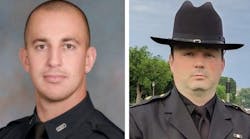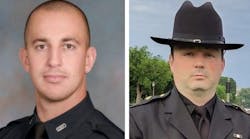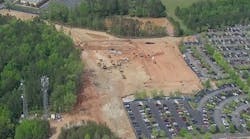Sept. 12--LAS CRUCES -- A fire chief and a paramedic have accused Dona Ana Sheriff's Office supervisors of withholding critical support during times of need, an allegation the sheriff rejects.
The fire chief and paramedic, who have more than 35 years combined experience, spoke to the Sun-News under the condition of anonymity as both fear retaliation. Both said the problem is a recurring theme, happening almost daily.
While Sheriff Todd Garrison readily admits his department is under-staffed, he roundly rejects any insinuation that officers are not responding to the best of their ability -- and says if there is a real problem, all parties should work together to address it.
"These complaints are unsubstantiated and do not take into account the fact that our agency is a primary emergency response agency," Garrison said in an email Friday. "We provide back-up and assistance to non-emergency calls as it's available, and we would be violating our primary trust and mission if we ignored emergency calls in order to provide support on every non-emergent, non-enforcement or medical call for the fire department." Garrison pointed out that other local law enforcement heads, including New Mexico State Police Capt. Rich Libicer, have said recently that area departments have "a good working relationship with the sheriff's office."
"Both of us are limited in resources," Libicer told the Sun-News in an interview last month about similar complaints of non-support. "It's important we work
together and provide the service to the citizens that we get paid to provide. I don't think it's that much of an issue. I think some people make more of it than it is."
Increasing volume
The allegations of the fire chief and the paramedic were initially reported by some state and city police officers last month -- a few "arrogant" and "apathetic" supervisors denying dispatchers' requests for deputies on calls that could turn violent, such as domestic disputes, calls where screaming is heard in the background or in situations where individuals are drunk and disorderly, the two say.
"We don't carry guns," the paramedic said. "We don't have bulletproof vests."
"I can't put my guys at risk," the fire chief said.
Garrison denies that deputies are "not allowed" to assist, saying that too often those in the short-staffed department are already busy with high-priority calls. Responding to all fire support calls would increase the sheriff's office's call volume by 21 percent, he said.
"It's not that we are ever unwilling to provide assistance; the reality is that we are many times unable," Garrison said.
Securing the scene
The problem has been getting worse over the last two years, said the fire chief and paramedic, and mostly in the areas just outside Las Cruces -- Organ, Dona Ana and the south valley -- and are some of the busiest areas for the sheriff's office. Multiple meetings with sheriff's office management to address the problem haven't been fruitful, the fire chief and paramedic said -- something Garrison said is absolutely not true.
"The consensus is, our job has an inherent risk," the paramedic said. "Pretty much (DASO management has said) 'Deal with it.'" He added: "I told (one sheriff's captain), 'Take off your vest, take off your guns and go on the same call with us.' His response was, 'Well, we have old vests we can give you.'"
Garrison says management "has not been invited or made aware of any so-called meetings with other agencies to address these allegations. Further, the Dona Ana County Sheriff's Department has never been made aware of any problems, allegations, or situations where our assistance or service was criticized by the fire department."
He also says that a recent department emphasis on community policing may be reducing manpower at times by focusing deputies' attention on their community districts, which "may well impede assistance to other areas during busy periods."
Frequently, all it takes is a deputy's presence to provide "scene security," the two said, but without one, situations like scuffles between a father and his intoxicated son can become violent, causing fire and ambulance workers to call for backup from state police, Border Patrol and even the Department of Transportation.
When city fire calls for their help, "never, never, never has LCPD refused to go to those similar calls," the paramedic said, pointing out that city police responds to more calls. But Garrison says that comparison is a stretch, given that DASO covers an area 73 times larger than the city. "We've never been turned down (by other agencies)," the paramedic said.
"One time, state police was 50 miles away. They didn't say no," the fire chief said. "DASO flat out tells us 'no.' "
The supervisors "have a boss," the fire chief said. "The sheriff is there for a reason. He has to control his department and help those who provide a service ... He sat there during the elections and said, 'I'll work harder.' I haven't seen him since."
He added, "It's been brought up so many times it's like talking to a wall."
Command decisions
Sometimes, the two said, they have found out that officers have been available -- after supervisors said no one was free -- or deputies have tried to responded by repeatedly driving by when their supervisors have told them not to.
That's fine with management, Garrison said.
"If any of our deputies witnessed someone in trouble, or in need of the assistance of law enforcement, duty dictates immediate assistance," he said. "In the event of a non-emergency, and non-enforcement assistance were requested and call volume or manpower were such that an immediate response was not possible, deputies in the area would 'drive by' to stay close in case a problem developed. Deputies cannot be in all places at all times, and have to be strategic in their determination of where to be."
It's not just in potentially violent that deputies would be helpful, say the fire chief and paramedic, but incidents like illegal burns where a property owner on scene needs to be issued a citation and rescues and medical calls where onlookers and crowds of upset family members cause traffic jams and block emergency vehicles. In one recent scene, just after a deputy was called away from traffic control after a gas leak in front of East Picacho Elementary School, a drunk driver careened onto the scene and over a hose, coming to rest "inches away" from firefighters, the fire chief said.
"We had to secure him," he said. "It's not what firemen do, on top of (responding to) a potentially major incident."
Garrison said in cases of fire codes, it's not deputies who should be responding, but the Fire Marshal's office. As for crowds, deputies can't bar them from gathering unless they're breaking the law, he said. And while he couldn't comment directly on the East Picacho incident, he said it was "highly unlikely" a deputy could have been able to prevent the near collision.
"[I]f multiple agencies were already on that scene, and that deputy received a competing call that no other deputy was available to cover, he or she and their command chain had to make decisions," Garrison said. "They are not always easy decisions, but they are always dictated by a driving mission to protect public safety, never to compromise it."
The two critics said they don't take the situation personally.
"But the safety of our employees is paramount," the paramedic said. "And we can't force our men to go in somewhere that's not safe ... We don't want them to go on all our calls, but when we say we need it, go."
The fire chief agreed: "We don't pick and choose. We get called out, guess what? We go."
Garrison said the decisions made in responding are not always easy to make, but that all public safety employees are a team -- and help each other as much as possible.
"Above all else, the Dona Ana County Sheriff's Department cannot function without the assistance of other agencies, and they cannot function without ours," Garrison said. "It is important to note (these allegations) ... have never been brought forth to our office, and -- simply put -- we cannot adequately address potential problems or situations until we are made aware of them."
Ashley Meeks can be reached at (575) 541-5462
Emergency response
The Dona Ana Sheriff's Office covers a service area of 3,804 square miles
The Las Cruces Police Department covers a city 52 square miles large
The sheriff's office responded to about 91,000 calls for service in 2010 -- not including codes enforcement and animal control
Dona Ana County volunteer fire departments respond to more than 19,000 calls in 2010
Source: Dona Ana Sheriff's Office


